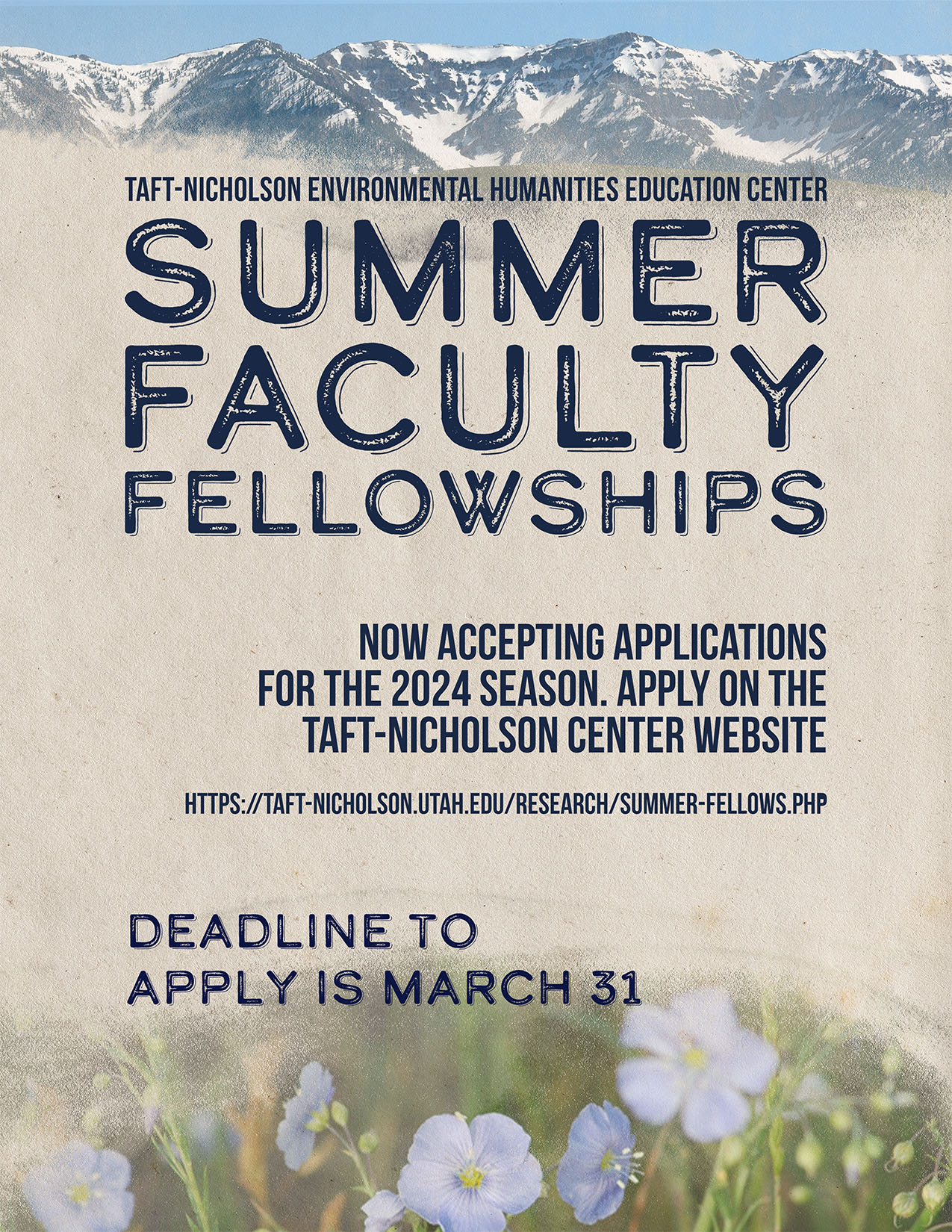 Taft Nicholson Summer Faculty Fellowships
Taft Nicholson Summer Faculty Fellowships
The Taft Nicholson Summer Faculty Fellowships are available to faculty in all disciplines for 1-3 weeks of dedicated writing time for scholarly pursuits of research or creative projects. Fellowships are available July 1 thru July 25, 2025. Faculty who have held a U of U faculty appointment for 1 year or more are eligible to apply. These fellowships are designed to provide intensive, dedicated, writing time for faculty to work on their research/creative agendas.
The Taft-Nicholson Environmental Humanities Education Center (TNEHEC) and the Vice President for Research will award the faculty member $1,000-$2,000 (depending on length of stay) which is intended to cover lodging, travel to and from the Center, food, and supplies. Fellows will be housed in “Thoreauian-like” cabins in University Village. The Village consists of 11 cabins, a bathhouse and a kitchen/dining cabin. Fellows may purchase meals for $65/day when courses are in session at the TNEHEC.
Application Deadline: March 31
- Soundness and significance of the proposal
- Proposals potential benefit to the individual, the University and the community
- The chair’s evaluation of proposal
- Application Form (includes department chair’s signature)
- Statement of what you intend to accomplish during the fellowship. The statement should be no more than 2 pages, single spaced.
- A 150 word abstract
- Statement of why the TNEHEC is an appropriate location for the fellow’s residency
Applications are due March 31.
The recipient of the Taft-Nicholson Summer Fellow Residency must submit a 1 page, single-spaced, Final Report within one year after receiving the award. The following information should be included in the final report:
- What researchactivities did you do with this fellowship?
The committee will not consider a new application from an investigator until a final report from the previously awarded Taft-Nicholson Summer Fellow Residency is submitted.
Please submit your final report to TNEHEC Summer Faculty Fellow Review Committee Taft-NicholsonCenter@utah.edu.
The Taft Nicholson Summer Fellow Residencies are available to faculty in all disciplines for 1-3 weeks of dedicated writing time for scholarly pursuits of research or creative projects. Awards for the faculty member will be $1,000-$2,000 (depending on length of stay) which is intended to help defer the cost of travel to and from the Center and cover per diem to purchase food and supplies.
Instructions
- Completed application form (including chair’s signature).
- Statement of what you intend to accomplish during the fellowship. The statement should be no more than 2 pages, single spaced.
- A 150 word abstract.
- Statement of why the TNEHEC is an appropriate location for the fellow’s residency.
- Application packet is due to the College of Humanities Dean’s Office RM 2100 LNCO or electronically to Taft-NicholsonCenter@utah.edu by March 31st for the upcoming season.
- Final selections of Fellows will be announced by April 30, for the upcoming season.
- If successful in your bid for a Taft Nicholson Summer Fellow Residencies, you will be required to:
- Submit a report to within one year of the end of the award period.
- Submit two copies of the creative work resulting from the award.
- Comply with University of Utah policy regarding all potentially patentable research. (See Policy and Procedures Manual 6-4).
Click Here to download and print out the application form (.doc)
Conditions of Residency
At an elevation of more than 6,600 feet and with plenty of sun, it is easy to get dehydrated. Bring a water bottle. Refill it often. Bring sunscreen and apply it liberally. Hats and layers are a must!
In our efforts to make the Center more sustainable, we ask everyone to bring their own toiletries. Additionally, Fellows staying in the Village are required to bring a sleeping bag, sleeping pad, and a towel.
In the unlikely event of an emergency, the Center has an Emergency Response Plan. We coordinate with our immediate neighbors, the Red Rock Lake Wildlife Refuge staff, and the Beaverhead County Emergency Response Team. We are certified in Wilderness First Aid. Again, upon your arrival we will provide an orientation session that further outlines safety guidelines and Refuge regulations.
Please bring your medications, and please be sure to tell the Center staff, in advance, about any allergies or conditions. The following phone numbers can also be used to contact you at the Center in case of a serious emergency: 406-276-3202 or 406-276-3207.
